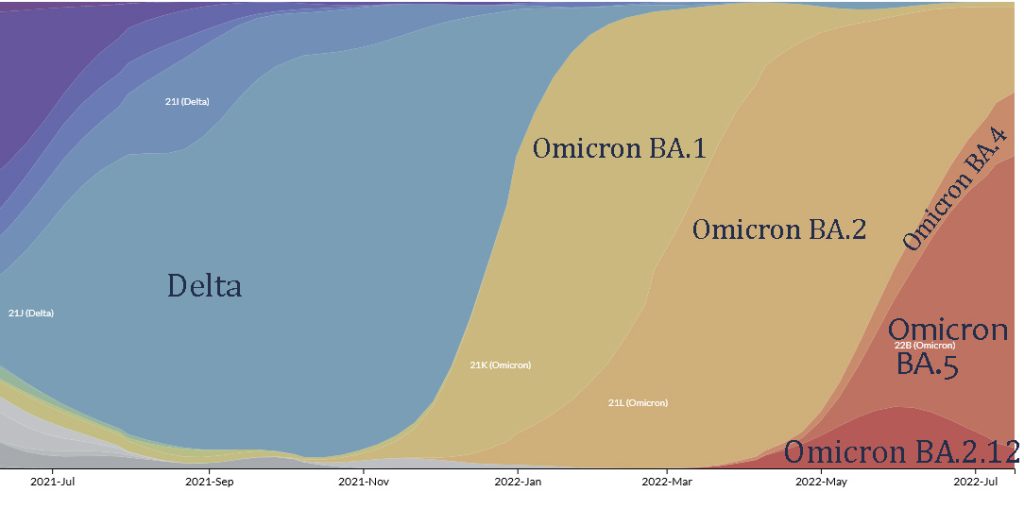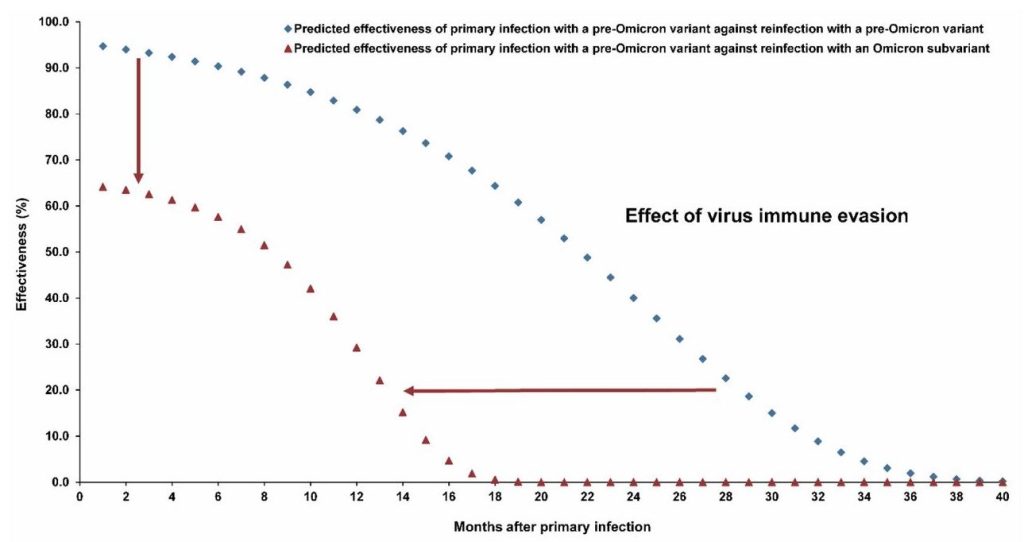Natural immunity against Omicron from a previous Omicron infection is better than advertised (75%+) so far
Two new interesting studies out of Qatar in the last month show that natural immunity against Covid is better than recent headlines suggest, and also that (as expected) immunity created from a real infection lasts about three years whereas vaccine immunity may “last only one” (at best, and if that).*
Although people who caught early variants (up to Delta) are only 28% protected against catching the latest Omicron BA5, people who have caught some form of Omicron itself already may have 75 – 80% protection. And what really matters is that everyone who has caught any form of Covid has “robust” protection against severe disease.
Qatar is an interesting population to study — it has a youngish demographic and they can literally include everyone which removes a lot of selection biases. It’s a very diverse conglomerate: Nearly 90% of Qatar’s population are expatriates from over 150 countries, coming …because of employment.
The first study is one of the longest term research projects on Covid to date. Chemaitelly et al followed people who got Covid in Qatar from nearly the beginning of the whole pandemic. They estimate protection against reinfection starts off at 90% and gradually declines over the next couple of years, until it reaches nothing, they figure (with Gompertz curves), by about 32 months. The good news is that protection against severe infection appears to be robust, even when people do get infected again.
Now that doesn’t mean there isn’t some cumulative damage from reinfection (and other studies suggest there might be, which I’ll discuss soon), but at least the second infection itself probably won’t put people in hospital or a morgue. As far as decisions for boosters go, will doctors tell their patients about this data?
There was never any justification for forcing people to take vaccines if they already had natural immunity.
Only Omicron really protects against Omicron reinfection
The second study (Altarawneh et al) from a similar group of researchers, looked at the most recent data when the superinfectious BA5 variant was spreading rapidly in May and June this year. They estimate that immunity against old Covid infections (Delta and earlier) are not that useful in stopping these later two Omicron variants. People who caught Covid in 2020 and 2021 appear to have about a 28% protection against reinfection. But people who caught an early variant of Omicron are much better protected — with 75% – 80% protection against reinfection. Part of the weaker protection from catching an early variant of Covid is because the virus has changed shape so dramatically, and part of it is due to the waning of immunity. Obviously people who caught the original Wu-Flu are a long way past the infection.
This graph below is the past year of Covid variants globally. Obviously Omicron BA.5 is taking over. It was virtually unknown at the start of May but now is about 63% of global infections. Depending on which country you live in, you can check the Nextstrain database to see which strain was dominant at various times (like say, when you may have caught Covid, so you can figure out what the variant may have been). (Mouseover their graphs).

The past year of Covid variants. | Nextstrain (scroll down)
One coronavirus infection wards off another— but only if it’s a similar variant
McKenzie Prillaman, Nature
Natural immunity induced by infection with SARS-CoV-2 provides a strong shield against reinfection by a pre-Omicron variant for 16 months or longer, according to a study (Chemaitelly). This protection against catching the virus dwindles over time, but immunity triggered by previous infection also thwarts the development of severe COVID-19 symptoms — and this safeguard shows no signs of waning.
The study, which analyses cases in the entire population of Qatar, suggests that although the world will continue to be hit by waves of SARS-CoV-2 infection, future surges will not leave hospitals overcrowded with people with COVID-19.

Chemaitelly: The top line shows protection of early variants against other early variants. The lower line shows what happened when Omicron arrived. Presumably natural protection from Omicron against Omicron is similar to the top line.
Now they tell us…
Regardless of the extrapolations, the data indicate that naturally acquired immunity is hardy — something that is not always championed.
“In the US, we were underselling the immune protection provided by previous infection,” says Jeffrey Morris, a biomedical data scientist at the University of Pennsylvania in Philadelphia. He adds that the Qatar team’s study affirms the substantial evidence for natural immunity’s capabilities.
The second paper looked specifically at Omicron protection against Omicron:
Prior Omicron infection protects against BA.4 and BA.5 variants
To see how much protection previous infection offers against the two Omicron subvariants, Abu-Raddad and colleagues analysed COVID-19 cases recorded in Qatar between 7 May this year — when BA.4 and BA.5 first entered the country — and 4 July. They looked at the number of people known to have been infected previously who tested positive or negative for COVID-19, and identified which infections were caused by BA.4 or BA.5 by examining positive test samples to see whether they contained a protein that these subvariants lack.
The researchers found that infection with a pre-Omicron variant prevented reinfection with BA.4 or BA.5 with an effectiveness of 28.3%, and prevented symptomatic reinfection with either subvariant with an effectiveness of 15.1%. Prior infection with Omicron granted stronger protection: it was 79.7% effective at preventing BA.4 and BA.5 reinfection and 76.1% effective at preventing symptomatic reinfection.
Effectiveness of a previous pre-Omicron infection against symptomatic BA.4/BA.5 reinfection was 15.1% (95% CI: -47.1-50.9%), and against any BA.4/BA.5 reinfection irrespective of symptoms was 28.3% (95% CI: 11.4-41.9%). Effectiveness of a previous Omicron infection against symptomatic BA.4/BA.5 reinfection was 76.1% (95% CI: 54.9-87.3%), and against any BA.4/BA.5 reinfection was 79.7% (95% CI: 74.3-83.9%).
The study was implemented on Qatar’s total population, perhaps thus minimizing the likelihood of bias.
*Natural immunity may last three times (or even five times) as long as vaccine induced immunity
“Three times longer” is probably an underestimate. Other studies suggest vaccine immunity doesn’t last for “a year”. One Swedish study of 840,000 people showed vaccine efficacy at 7 months was zero. But I’ll just quote the Chaimatelly paper, which buried this comparison in the text:
Protection of natural infection waned with time after primary infection, prior to Omicron emergence, and reached ∼70% by the 16th month. This waning likely reflects genuine waning in biological immunity rather than viral immune evasion, as pre-Omicron variants demonstrated much less immune evasion than Omicron.14–16 This waning in natural immunity mirrors that of vaccine immunity,4, 6, 30 but at a slower rate. Vaccine immunity may last for only a year,4, 6, 30 but natural immunity, assuming Gompertz decay, may last for 3 years, as also suggested by long- term follow-up of SARS-CoV-1-associated antibodies,36 and incidentally not dissimilar to pandemic-influenza-associated antibodies.37
Immune evasion of Omicron subvariants reduced overall protection of pre-Omicron natural immunity and accelerated its waning (Figure 3), mirroring the effect of Omicron on vaccine immunity, but at a slower rate. Vaccine immunity against Omicron subvariants lasts for <6 months,5, 7, 8 but pre-Omicron natural immunity, assuming Gompertz decay, may last for just over a year.
Despite waning protection against reinfection, strikingly, there was no evidence for waning of protection against severe COVID-19 at reinfection. This remained ∼100%, even 14 months after the primary infection, with no appreciable effect for Omicron immune evasion in reducing it. — Chaimaitelly et al
Informed consent means knowing more about natural immunity as well as vaccines and the risks associated with them. Given the risks of vaccination, once people have had any variant of Covid, are there any benefits for “boosting”? These are questions doctors or bosses need to answer.
- Blockbuster paper: Covid vaccines may not improve your chances of staying alive at all even in a pandemic
- Vaccine risk? Blood markers suggest an increased risk of heart attacks
- Game-changer: US Military Data shows much higher rate of vaccination injuries
- Insurance chief talks about “unheard” of rise in deaths in working adults
- Natural immunity, still strong and durable 20 months later (no boosters needed)
- mRNA vaccines produce huge amounts of Spike protein and for two months!
- Pfizer vax data is so good, FDA wants to hide it til 2096! (Where is that data?)
REFERENCES
Altarawneh et al (2022) Protection of SARS-CoV-2 natural infection against reinfection with the Omicron BA.4 or BA.5 subvariants,
Chemaitelly et al (2022) Duration of immune protection of SARS-CoV-2 natural infection against reinfection in Qatar, medRxiv 2022.07.06.22277306, DOI: https://doi.org/10.1101/2022.07.06.22277306, https://www.medrxiv.org/content/10.1101/2022.07.06.22277306v1
Michlmayr et al (2022) Observed protection against SARS-CoV-2 reinfection following a primary infection: A Danish cohort study among unvaccinated using two years of nationwide PCR-test data, DOI:https://doi.org/10.1016/j.lanepe.2022.100452